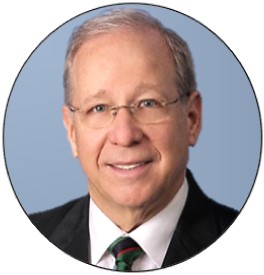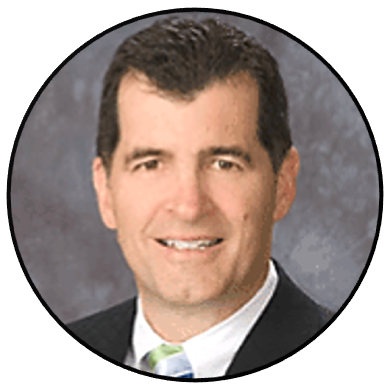Index Investing Expert Rick Ferri Answers Advisor Questions About Passive Investing And Why The “Death” Of Buy And Hold Has Been Greatly Exaggerated
Ferri received rave reviews from many advisors attending the session. He’s a great speaker and his research is through.
Since we did not have enough time to get through all of the questions from attendees, we asked Ferri to answer some advisor questions.
How about using options with ETFs?
There’s no such thing as a free lunch. Options are less than a zero game. For every winner there is a loser, and there’s cost on both sides. Those costs are the option premium, commissions, trading spreads, and potentially higher taxes to the winner. In the long-term, your better off having the right stock and bond allocation and sticking too it.
Market cap versus fundamental weighted indexing. Do you believe in using both, or just market-cap weightings?
I believe there are other risks in the stock market besides beta. The Fama/French three-factor model points to value and size as two risk factors not related to beta. Investing in those risks deserve a risk premium in the same way higher beta portfolios deserves a risk premium. If an advisor chooses to use a three factor risk model in portfolio construction, then fundamental weighting appears to be an efficient way to do it.
DFA uses some form of active management with its index funds, making it different from a 100% pure replication strategy like the Vanguard 500 Index Fund. I heard you say that you use some DFA Funds. Please explain your thoughts on using a “pure” index fund strategy versus one with some active management. How much active management is too much?
First, where does one draw the line between active management and passive management? Some people would say that the Vanguard 500 is active management because a committee selects the stocks in the S&P 500. Well, I’m not that strict. An index represents a broad market or a risk factor. Then we have trash indexes. Take the Dent Tactical ETF (DENT). It follows Harry Dent’s market timing index. What the heck is that? It’s not useful for anything. It’s not a representation of a market or a risk. It’s active management strategy repackaged to look like an index.
The question becomes not whether you should use an index fund, rather, it’s which fund strategy best captures the risks you’re seeking in a portfolio and does it with minimum cost. DFA doesn’t have index funds because they’re not tracking any indexes, but I would use them in a second over the Harry Dent index trash. DFA is trying to capture certain macro market risk premiums with their fund structure. They combine together large numbers of securities that have similar risk characteristics to accomplish this goal, and charge a low fee for doing it. As such, DFA funds are more like a broad market index fund than many products being sold as index funds.
DFA funds are fine to the extent that you are trying to capture various market risks in a portfolio of mutual funds. You can engineer this risk based portfolio using only DFA funds, some DFA funds, or no DFA. There are many value funds and small cap funds on the market, and most of these funds are interchangeable.
Do you invest in sub-indexes, like mid-caps, growth, value, etc., and sector indexes? Commodities? Please explain your views on using subsets of asset classes.
We divide stock portfolios into three sectors: US, developed, and emerging. Each sector starts with a core position in a diversified “beta” fund and then the portfolio is tilted to small cap value stocks. We also have a position in US REITs. We don’t have international REITs or international bonds because the cost of investing in those asset classes is still too high, IMO.
Commodities are a 0% real returning asset class. In the long-term, you’ll get the inflation rate minus fees. Commodities may reduce the overall risk in a stock and bond portfolio AT TIMES, but it also reduces the long-term return. We only invest in asset classes that provide a real rate of return over the long-term, and provide cash flow (stocks and bonds).
Your firm does not offer financial planning services? Why not? Did your firm ever provide planning services?
Our firm does investment planning, which is subcategory of financial planning. We have deep discussions with clients about their financial goals and what they expect their money to do for them today and in the future. In addition, clients are welcome to ask questions about estate planning, insurance, taxes, stock options, etc, and we will give them our general opinion about these topics. But we don’t do insurance plans or analyze estate documents or do tax returns or run stock option exercise programs. Since we don’t do these things, we don’t list our firm as offering financial planning.
Why don’t you expand your business by offering a planning service targeting your asset management clients at an additional fee?
We’re not trying to be all things to all people. There are many excellent financial planners, attorneys, CPAs, etc. who are experts in their field. These people charge by the hour or on a retainer, and they offer much better advice than we could every hope to.
What is your current asset allocation for income-oriented investors in retirement?
It depends on the client; i.e. how much they have, what other sources of income they have, how much income they need from the portfolio, what are their taxes, etc. There’s no one size fits all.
What would the compounded excess return of 1% be on a $1 million portfolio over a 25-year retirement? In other words, if you could return an average of 7% versus 6% annually over that 25 years with a passive buy-and-hold approach, what would the total value be of the two portfolios?
That’s a simple spreadsheet calculation. Assuming $1,000,000 today, no contributions or withdrawals, a 6% return earns $1,135,562 less than a 7% return over 25 years.
Do you manage the portfolios differently for those that are accumulating versus those making distributions? What is your current asset allocation for a 55-year-old couple in the accumulation stage?
It depends on the client; i.e. how much do they have, what do they need and how much, and when do they need it. There’s no one size fits all.
How do active managers if respond to you when presented with your evidence of the efficacy of index investing?
They start talking about Warren Buffett. The problem is that they’re not Warren Buffett. In fact, most don’t even own Berkshire Hathaway stock, so perhaps they think their better than Warren Buffett.
Data you presented on dollar-weighted “actual returns” based on fund cash flows covered professional financial advisors as well as individual investors. Has anyone published advisor-only actual returns? Do you have an opinion about how well advisors perform versus retail investors?
The closest I’ve seen it the Morningstar data. The results are pretty close to the same. Most advisors suffer from the same biases as individual investors because they are individuals themselves.
Do you have any data showing how much rebalancing annually adds to portfolio performance over rolling 10 year periods?
Yes, the data on each decade going back to 1950 is in “All About Asset Allocation”. Rebalancing doesn’t add to portfolio return every 10 year period, but it does tend to lower risk even in the years when returns were not enhanced.
You said you don’t use commodities in portfolios? Why? Isn’t more diversification better?
Not if the asset class you’re diversifying into has no expectation of a real return. Low correlation (at times) is fine, but it’s not the end all for deciding if an asset class should be added. An asset class is useless if portfolio return is also lowered. For example, burying cash in glass jars has low correlation with stocks and bonds. Would you recommend that your clients do this? Of course not. Low correlation is not everything. Return matters more.
Your competitors are large retail discount brokers, such as Charles, Schwab, Fidelity, and TD Ameritrade. Why is your service better than theirs? And how can you compete with their TV marketing campaigns?
Those firms are not our competition. First, the reps at those firms are not interested in promoting all-passive strategies. They’re encouraged through compensation to sell higher fee products and services. Second, self-taught investors who are seriously seeking advice on low-cost index and ETF investing eventually figure out who knows what their talking about and who doesn’t.
The deluge of marketing dollars from Wall Street is always an uphill battle. We have to rely on investor self-education and sensibility because Wall Street will always outspend us.
This Website Is For Financial Professionals Only

















